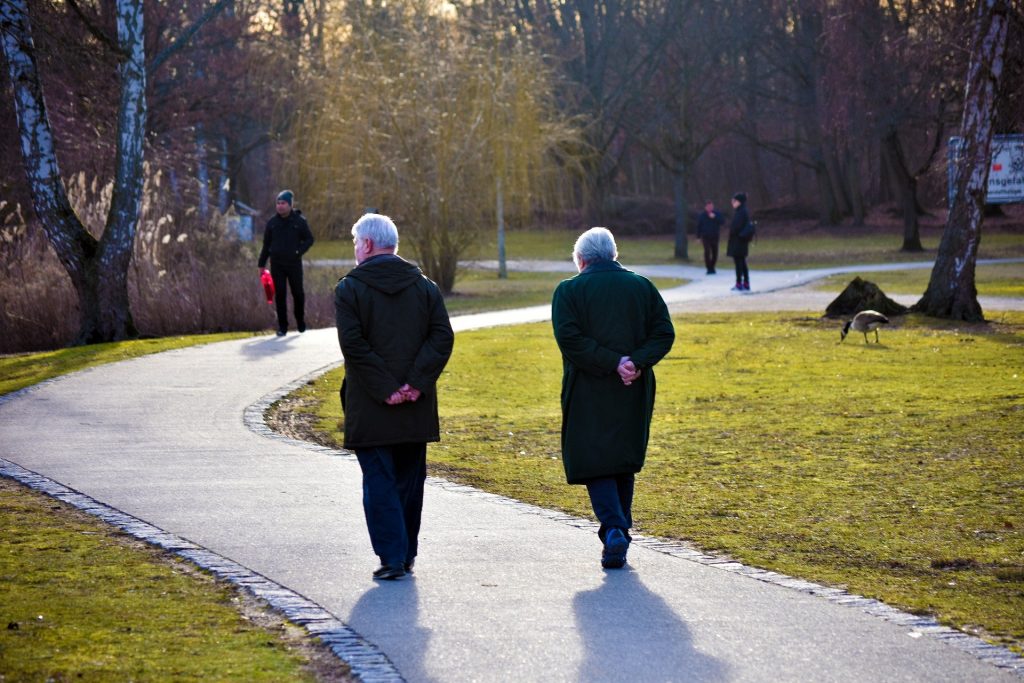Lifelong healthy habits not only help to increase your lifespan but also your healthspan, the time period in which you enjoy good health. As we age, a healthy lifestyle promotes physical and mental well-being.

Tips for Healthy Aging
Follow these tips at any age to promote healthy aging!
Social activities: Stay connected to your community through volunteering, practicing hobbies, attending concerts and plays, gardening, or taking lifelong learning classes to enhance mental health.
Physical activity: Being active can help you live longer on your own and prevent falls. Engage in activities like walking, bicycling, swimming, or stretching classes to promote balance, flexibility, coordination, energy, and overall health.
- The Physical Activity Guidelines for Americans recommend that adults get at least 150 minutes (2.5 hours) of moderate-intensity aerobic activity per week and engage in strength-training at least two days each week. If your physical condition does not allow for this level of activity, be as physically active as your abilities permit.
Healthy eating: Eat meals that include vegetables, fruit, whole grains, and a good protein source, such as beans, meat, and low-fat dairy. A healthy diet ensures adequate intake of vitamins, minerals, and nutrients that support bone health, immune function, protect muscle mass, and maintain a healthy weight.
Hydration: Keep a water bottle on hand and stay hydrated for optimal health. Water is critical for many bodily functions, such as circulation and digestion. Foods like fruit, vegetables, and soup also contain water and can help with hydration.
Health care: Schedule regular health and vision check-ups. Stay up to date on vaccines such as influenza (flu), herpes zoster (shingles), and tetanus.
Sleep: Adequate sleep supports physical and mental well-being. Try to get no less than 6 hours and no more than 9.
Stay Socially and Physically Active
Find activities that you enjoy and fit your lifestyle. Consider:
- Joining a walking club
- Volunteering
- Gardening
- Trying a new hobby, like photography
- Writing letters to family and friends
- Solving word puzzles
- Starting a book club

Handle Foods Safely
Safe food handling is essential, especially for older adults. Aging can impact factors that make older adults more susceptible to foodborne illness, such as immune health, rates of digestion, acidity of the stomach, liver and kidney function, and sense of taste and smell.
Two-hour rule: Throw away perishable foods that have been at room temperature for 2 hours or more. Eat, refrigerate, or freeze these foods within 2 hours.
Leftovers: Store leftovers in a covered container in the refrigerator; it can be helpful to label with the date. Plan to eat or freeze within 3 days.
Reheating: Reheat food to 165°F, or until steaming hot. Use a microwave- or oven-safe dish, not the delivery or take-out container.
Check temperatures: The only way to know food has been cooked and stored at proper temperatures is to use a thermometer.
- Use a food thermometer to check that foods reach safe minimum internal temperatures.
- Use a refrigerator thermometer to ensure the temperature of your refrigerator is 40°F or lower and the freezer is 0°F or lower.
Visit the National Institute on Aging’s website for more information on healthy eating, cognitive health, physical activity, and more: https://www.nia.nih.gov/health/topics/healthy-aging.

